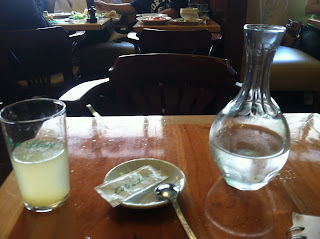 For a culture so aware of the serious environmental threats
we face, it is interesting to see how many plastic water bottles the French
use. For instance, we were at the International Energy Agency in Paris
discussing environmental sustainability, and what were we offered? Plastic
bottles. Even worse, 15 out of the 16 people drank them. Yes, that one person
was me. So why do people need to drink bottled water when there is perfectly
clean tap water? Well, let’s start from the beginning.
For a culture so aware of the serious environmental threats
we face, it is interesting to see how many plastic water bottles the French
use. For instance, we were at the International Energy Agency in Paris
discussing environmental sustainability, and what were we offered? Plastic
bottles. Even worse, 15 out of the 16 people drank them. Yes, that one person
was me. So why do people need to drink bottled water when there is perfectly
clean tap water? Well, let’s start from the beginning.
After I watched the documentary Tapped, I learned that it was the
French company, Perrier, that popularized bottled-water in the 1970s. It was
for the elite. With the “most natural” of all waters, why would it not be
(disclosure: in reality 40% of bottled water is really filtered tap water)? It
was exported to America where it simply became the convenient norm. Did you
know that Americans use enough water bottles to circle the earth 250 times in
just one year! Crazy! Anyway, back to France.
 It has become such a standard that no one thinks otherwise.
While many Parisians will pass a plastic bag tax in a second, they will not
think twice about gulping down a plastic water bottle and then throwing it in
the trash. Trash, not recycling. Granted there are some recycling bins, but for
all the bottled drinks that Parisians use, you would think there would be more.
It has become such a standard that no one thinks otherwise.
While many Parisians will pass a plastic bag tax in a second, they will not
think twice about gulping down a plastic water bottle and then throwing it in
the trash. Trash, not recycling. Granted there are some recycling bins, but for
all the bottled drinks that Parisians use, you would think there would be more.
I have been playing a little game to see how long it takes
me to find a recycling bin after drinking a nice Orangina. So far my average
time is 20 minutes. That’s 20 minutes of active looking. Remember that
convenience is the key to effective recycling, so if there are no recycling bins
in sight, most people will not hold onto a bottle 20 minutes, much less 1
minute, before they toss it.
 |
| Some of the recycling bins I saw- The idea of recycling on one side, trash on the other is an idea we need to adopt in the US! |
That said, some of the French bottled water companies do
something very interesting. According to Prof. Christian De Perthuis, a leading
environmental researcher, they pay the plastic bottle tax. This is basically a
few cents per bottle that goes to fund the recycling pickup. This has been
encouraged and tried in a few parts of the States (six states have adopted this
method of funding for bottled water). The company is able to put the label
“100% recyclable” to show its generosity. (NOTE: Recyclable does not mean the
bottle is made from recycled material!) Unfortunately, in the U.S. many of the
bottled water industries such as Pepsi and Nestle have too much power for this
ever to happen.
So, the French are ahead of the U.S. on their way of funding
the recycling of water bottles, but as for the use of them, that is another
story. Like I said before, it is just ingrained in the culture. And once
something is ingrained in a culture, especially the Parisian culture, it is
hard to change.
 |
| Our group (The School of Ethics and Global Leadership) with Prof. Christian de Perthuis |






























